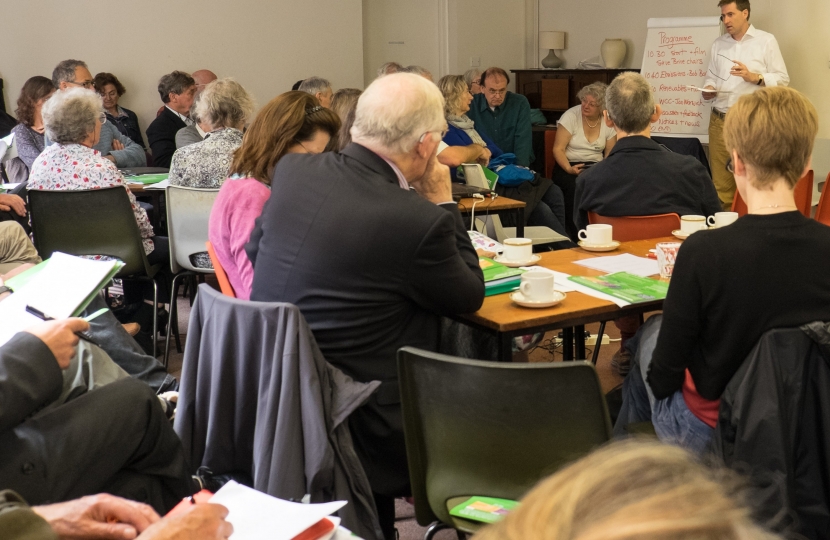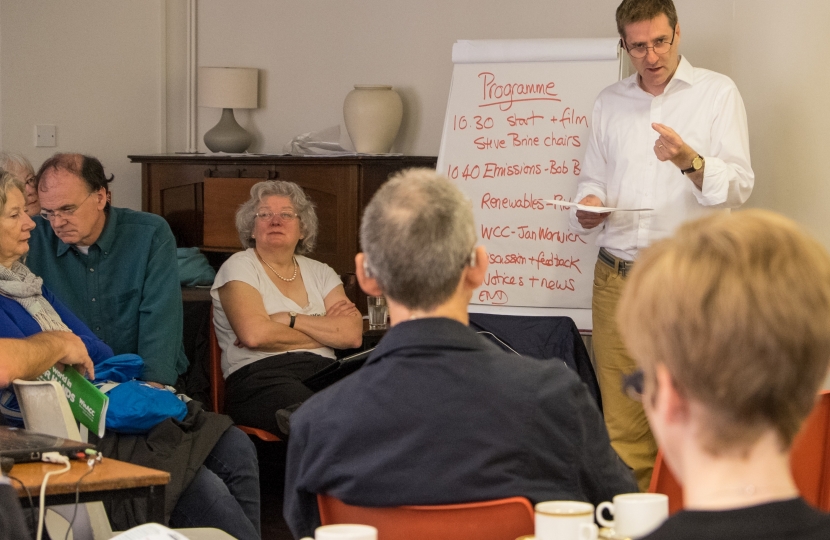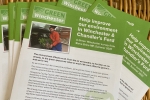Steve Brine chaired a major debate on the best way for Winchester District to do our fair share to meet our climate change targets, as eighty people crammed into St Lawrence's Parish Room on Saturday 7th June.
Introducing speakers on the national and European targets for greenhouse gas and renewable energy and their implications locally, WinACC Director Chris Holloway kicked off proceedings by saying that it was not a case of whether we do something about climate, but what we do, while a member of the audience highlighted the importance of local leadership in taking things forward.
Steve Brine then introduced Bob Barnes, a member of WinACC's panel of scientific experts. Bob set out WinACC's proposals for doing our fair share of cutting greenhouse gas emissions. In the Winchester District, we produce around one million tonnes of greenhouse gas a year, and he explained the need to cut this by 25,000 tonnes CO2e a year from 2016 to 2020 - a cut of 200 kilos a year for everybody in Winchester District.
Bob said: "This can be done. It means driving the car 600 miles less, or cutting out one short return flight to Europe, for example, to Brussels." Bob then suggested a target for better home insulation, for building a new Leisure Centre that could cut emissions by 80%, and for the proposed efficient district heating system for the hospital, prison and university.
Richard Ritchie, Chair of WinACC's Renewable Energy Group, said that we also need to get more of our energy from renewable sources instead of fossil fuels like oil, gas and coal. Less than 2% of the 1735 million kWh of energy we used in Winchester District in 2013 (not counting transport) came from renewable sources. Richard demonstrated how our local District could match the national commitments for renewable generation. 15% of the energy we use should come from local renewable sources by 2020. By 2025, it should be 25%, and 30% by 2030. A shift to heating using sustainably managed wood instead of gas and oil could play a big role, as can solar PV. Although wind could be important, WinACC's plan included little wind power because of uncertainty about the Government's intentions.
Richard said: "We could easily generate more renewable energy locally. We have worked out how we could do it using different renewable sources of energy, all based on identified resources and known technologies. If you want to vary the proportion of energy we suggest we get from each source, please let us know. But bear in mind that anything you want to remove needs to be replaced with something else, so that we still get to the target."
The economic benefits were emphasised by many speakers, including Cllr Rob Humby, the newly appointed leader of Winchester City Council. The Conservative leader spoke of the jobs in making homes more energy efficient, and new jobs in renewable energy schemes. On Thursday, the City Council approved a new route map to a low carbon economy.
His Conservative colleague, Cllr Jan Warwick, who holds the portfolio for the environment on the City Council, then set out the steps that the Council has already taken to save energy in the Guildhall and Council homes. For example, the new women's WCs have a new technology which saves 3 Olympic swimming-pools of water every 3 years. The Council has just surveyed all its housing, so it will be possible to see where they need to top up the insulation or install more efficient heating. Now that they can tell which roofs would be suitable for solar panels, the Council plans to have another look at the financial options for solar energy.
Jan Warwick promised to continue the City Council's partnership with WinACC, and to take the debate about our fair share back to the Council and the Low Carbon Board.
There was strong support for making existing homes more energy-efficient, with Steve Brine urging the Council to continue using the Green Deal to encourage people to act. People were worried at the Government decision to abandon the Code for Sustainable Homes, which Councils use to require developers to build new homes to high energy standards.
Jonathan Spencer of the Forestry Commission welcomed WinACC's proposal for better use of Hampshire's woodland. 1,000 tonnes of wood fuel creates at least 1 job, he said, and Hampshire could deliver 170,000 tonnes of wood fuel each year. As well as zero-carbon heating and jobs, wood used in buildings locks up carbon dioxide. The roof of Westminster Hall has locked up 600 tonnes of carbon for over 600 years.
In the lively discussion which followed, Martin Heath of the Hampshire Renewable Energy Group argued for wind power, while members of Keep Hampshire Green said that they wanted to tackle climate change, but not if it meant a wind farm in the countryside at Bullington Cross.
More information ...
WinACC is keen to take the debate to as many people and groups as possible, and they can provide speakers and handouts for meetings and help facilitate discussions. People can find the documents and WinACC's proposals, and a leaflet to respond to, at http://winacc.org.uk/ourshare. Email [email protected], or tweet @winacc, referring to #ourshare.



